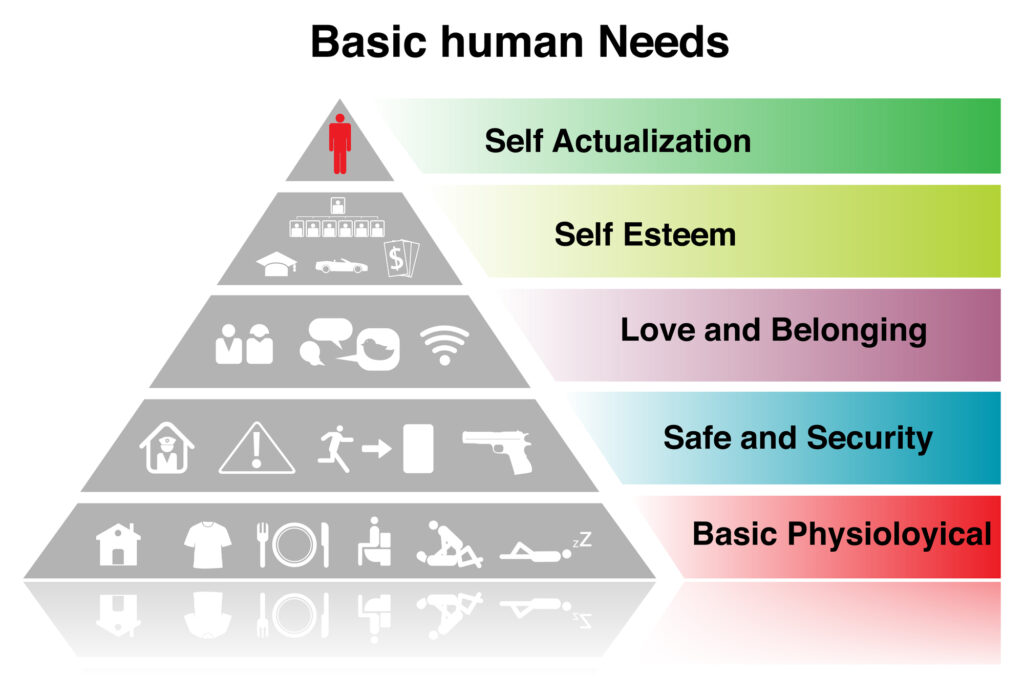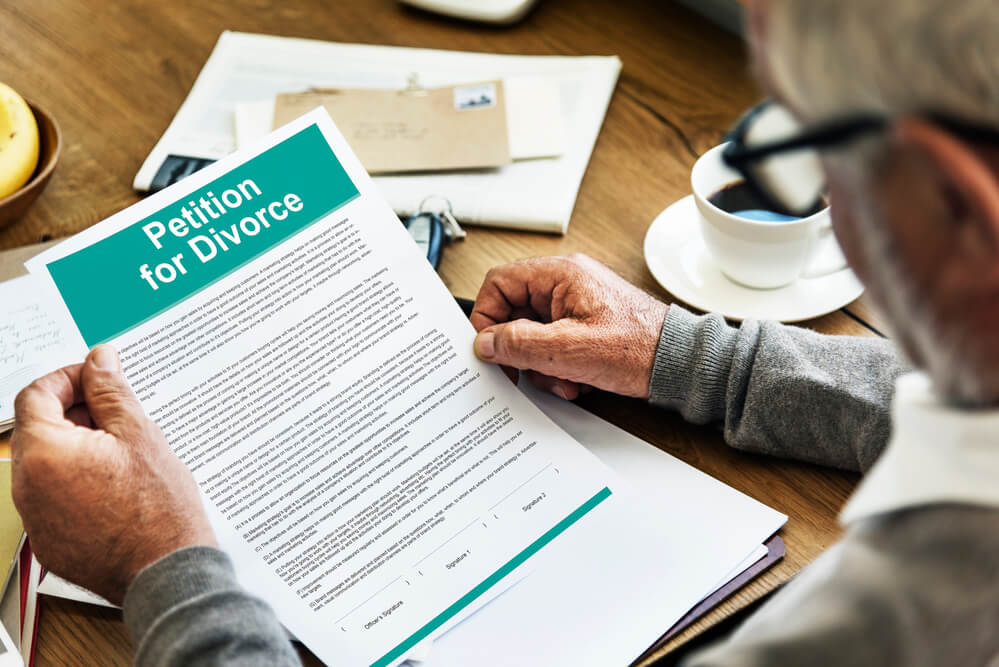Divorce Strategy ≠Enjoyment
As a word of warning, the Best Divorce strategies and concepts I’ll be explaining are not always engineered for enjoyment. Your reaction to some of what follows might be to feel uncomfortable. However, having the Best Divorce is probably going to require you to step outside of your comfort zone and act differently, because how you’ve acted leading up to now was a big contribution to the problem we are trying to solve. Nothing here is immoral or illegal. Everything is designed to make your life better as soon as possible and, in the long term, make your family and finances far better off than they would otherwise be. Isn’t that what you want?Psychology Lesson
An important component of divorce leverage and strategy is understanding what your spouse will likely place priority on during the divorce. So, for the first and and probably the last time here, we’ll get into explaining an academic psychology lesson.
According to Maslow (1943), all people are motivated to achieve certain needs, in an order of priority. Once lower level, basic needs are satisfied, people advance to satisfying higher level needs. Also, the longer that a person’s lower level needs go unmet, the stronger the desire becomes to meet the need.

Maslow’s original five-stage hierarchy of needs hypothesis is that people are motivated to satisfying their needs in the following order (courtesy of www.simplypsychology.org).
- Biological and Psychological Needs: air, food, shelter, warmth, sex, sleep;
- Safety Needs: protection from the elements, security, order, law, stability, and freedom from fear;
- Love and Belongingness Needs: friendship, intimacy, affection, and love;
- Esteem Needs: achievement, mastery, independence, status, dominance, prestige, self-respect, respect from others;
- Self-Actualization Needs: realizing personal potential, self-fulfillment, seeking personal growth and peak experiences.
So how does this all relate to your divorce? Maslow’s “Needs Hierarchy” explains what will motivate your spouse’s decision-making during your divorce.
What you need to know is that people are programmed to make decisions based on their perceived needs.
Generally, as more money is added to the equation, your spouse’s focus of what they want out of the divorce will graduate from basic economic priorities to preserving family relationships and then their social status.
The bottom line is if you understand what your spouse’s needs will be, then you can probably predict most of how they will behave during the divorce and what they will want out of the divorce.
You can then leverage this understanding to develop a divorce strategy around your spouse’s anticipated motivations to give yourself the best odds of obtaining an efficient, quick settlement and preventing your divorce case from going “off track.”
This is possibly worth more economically to you than anything else related to your divorce, so take the time to find out what will motivate your spouse’s decision-making.
The First Mover Advantage | Strategy for your Divorce #1
There is a “first mover advantage” with divorce. Given the tremendous personal and strategic preparation required by the Best Divorce, your spouse will be at an extreme disadvantage if the divorce begins with you already having “your act together” (see Step #1) and executing on a well thought out divorce strategy.
If you move first, unannounced, and don’t back off, your spouse will feel like they have their back up against a wall. Everything they are doing is “reactive” to you as they try to keep their head above water.
Psychologically, this can be a huge driver to an early settlement. For whatever reason, in my law practice, this seems especially true with women, or when the unprepared spouse feels like they are too busy with their business or occupation to defend themselves in their divorce.
Prepare for a Divorce | Do Not Create a Short Term Cash Crunch
The easiest way to have a miserable divorce is caused by giving away significant financial leverage to the other spouse before the divorce even gets going. Although creating this problem is unbelievably easy, the fix usually requires a lot of time and money for any divorce lawyer to fix.
You can avoid giving away leverage to your spouse by not making decisions that will create short term cash flow problems for you during your divorce. Regardless of whether you control more assets or income than your spouse, if you are not in control of your cash flow you will be fighting an uphill battle from the beginning.
The most common way people create a short term cash flow problem is by moving out of the marital home. For the economically dependent spouse, moving out of the house and creating a new set of housing expenses in the form of a rental or lease payment makes them dependent on their spouse to pay their newly created expenses.
This is not a good place to be when you are negotiating for your financial future, especially if you anticipate your spouse being upset with the divorce.
Don’t forget that cash flow problems affect higher wage earners too. High wage earners enter into terrible divorce settlements all of the time because they are freaking out about burning through their savings to fund expenses during the divorce.
Thankfully, besides dealing with being a bit uncomfortable in the short term, it is usually easy to avoid the creation of short term cash flow problems if you take the time to plan out a Best Divorce strategy.
In many instances, all you need to do is be the person who remains in the marital home. If anyone moves out, let it be your spouse.
Sometimes it is necessary to leave the house due to domestic violence issues or to escape extreme emotional abuse. Make sure to talk to your lawyer before going down this road. You cannot stay in the home if you are at risk for violence. Or if your spouse’s emotional abuse renders it impossible for you to “stand up for yourself” in the divorce.
If you are going to move out, make sure that you have enough money set aside to pay your expenses for at least a year. This will give your lawyer enough time to fix any short term financial problems if your divorce does not resolve early.
YOU Control the Money & Documents, Not your Spouse
You are asking for trouble if you hesitate, and give your spouse the chance to do bad things like cutting off your cash flow or making your money “disappear.” Yes, there are processes your lawyer can utilize to restore cash flow and find the money, but do you really want to go through all of that?
The Best Divorce you deserve is all about controlling the divorce process and getting it over as soon as possible without that type of preventable stress.
The bottom line is that if you control the money you eliminate many of the problems that unnecessarily complicate divorce while creating a much higher likelihood of getting your spouse to the bargaining table quickly and settling on fair terms.
This is the one of the main goals of the Best Divorce, and should be one of your main goals too.
Just as important as controlling the money is getting early access to information. This is especially important if your spouse has been up to no good or you are “in the dark” on the marital finances. Odds are you know where the information is that allows you to be more informed. If you don’t know, people can help you figure it out.
Further, when your spouse believes you “have everything”, there may be an extra incentive on their part to settle, even if this motivation is ultimately unjustified. Obtain and at least copy all of this information now, before there is any mention of divorce.
We cover this in great detail in Step #5: Get Organized For Divorce
Being a “Nice Girl” Will Not Stop the Divorce
The mind is a powerful thing. And it can be dangerous when it comes to divorce leverage and strategy decisions. Especially for those who are depressed about their spouse pursing a divorce over their objection.
Many people understandably go through an initial period of depression and denial of the fact that their spouse desires to pursue a life apart from them. If you are one of these people you need to understand that you are not going to get your spouse back by entering into an overly generous settlement agreement.
Being the “nice-guy” or “nice gal” will not get your family back and can make it harder for you to have any semblance of economic stability in your future life and relationships.
Instead, you need to find a good therapist to understand the reality of your situation and develop a plan for recovering from the end of your relationship.
Guilty Conscience Agreements & Exposing Secrets Tactic
Everyone has a secret they don’t want other people to know about. Do you? More importantly, does your spouse? In many instances, these “secrets”, which can range from adultery to corporate espionage, can all end up being exposed through a competent divorce lawyer conducting “discovery” in your divorce case.
Your understanding of these “secrets”, and the value your spouse attaches to them, can be the difference between quickly negotiating a fair settlement and several years of miserable and costly divorce litigation. Leveraging “secrets” through “guilty conscience agreements” could be your quick path to the Best Divorce.
If you obtain undeniable proof of your spouse’s inappropriate conduct, and strategically convey, or offer to convey, said proof, your case can be over fast. Your spouse, who may have been dreading the day they are found out, now knows “you know”, and dreads what you may do with the information.
If timed correctly (and timing is everything here), your spouse’s realization their secret may not be safe can be the “nail in the coffin” of finishing up a fair and reasonable settlement negotiation.
So, you might be wondering, is this “extortion”? Are you going to jail for leveraging your spouse’s “secrets” to get your divorce over quickly and spare your family and finances the strain or protracted divorce litigation?
The bottom line is you need to talk to your lawyer familiar with the laws of your jurisdiction, but in my view, the answer is “absolutely not” if your case is settled based on you and your spouse determining it is mutually beneficial to end your case, on fair terms, without engaging in further discovery and exploration of issues that would be relevant to your divorce case.
Affairs: Bringing Them Up & Keeping Them Hushed During the Divorce Process
Although it may be hard to believe, people who are not serial adulterers often cringe at the thought of their spouse finding out about their affair. Although the adulterer may not want to stay married, they feel terrible about the relationship ending because of the affair.
Further, and perhaps most importantly, the cheating spouse is usually very embarrassed about the affair, and would rather have friends and family believe they met their paramour after their divorce.
In other cases, the spouse has no remorse for the affair, but out of desperation to maintain the relationship with their new partner (who could be the first person they’ve loved in years) they will do anything they can to keep their paramour from being involved in their divorce case (especially then the paramour is also cheating on their partner).
For this reason, it is not uncommon for people who have been having an affair to desire a quick settlement to their divorce. This is especially the case with women who have been having an affair.
Equally important as confronting a spouse’s affair is keeping your infidelity or new relationship out of sight. Your spouse’s discovery that you are in a new relationship will in no way help your divorce case, and will almost always complicate your divorce. T
his is true even when your spouse is the one who first had the affair and your new relationship only started after the divorce case started.
Come on now, did you really think your spouse would, during your divorce, be thrilled to “congratulate” you on moving on from them? Well they will not. They usually are infuriated. Even if they have “no right” to be.
People who are infuriated usually do not settle their divorce cases quickly. This is not good for your bank account. Don’t do it.
It doesn’t matter whether you feel you are morally justified in the new relationship based on mistreatment during the marriage, your spouse having an affair, your spouse filing for divorce, or anything else. If you want your divorce over, on fair terms, as soon as possible, try to keep your new relationship “under wraps.”
Better yet, put new relationships on hold until the divorce is over.
Top Five Other Strategy Mistakes Checklist
We’ll round off this divorce leverage and strategy lesson with a “top five” list of other mistakes to avoid:- Do Not Underestimate Your Spouse: You married them and they know more than you think.
- Do Not Talk About Your Divorce Strategy: Your strategy is worthless when announced to the wrong people. And one day you might reconcile your marriage and wish you kept quite.
- Bank Records Leave Traces: Realize your spouse can find out about everything from your bank statements.
- Do Not Negotiate Until You Are Informed: Meet with a lawyer before making settlement offers. It is hard to settle for less than your first offer so make sure you know your legal rights before promising anything.
- If It’s In Writing Someone Can Find It: Be careful about what you put in writing (email, texts, internet) as you might be writing what is later evidence for your divorce court judge.
Divorce Lawyer: An Essential Partner in Your Divorce Strategy
When navigating the labyrinth of divorce strategy, the role of a skilled divorce lawyer cannot be overstated. Think of them as your chief strategist, offering tailored advice that aligns with the unique landscape of your case. Here’s how a divorce lawyer can make a world of difference in achieving your “Best Divorce.”
Expert Legal Advice
Divorce is a legal process, and as such, it’s laden with complexities that the layperson is often not equipped to navigate alone. A divorce lawyer brings expertise in family law and can guide you through the intricacies of property division, spousal support, child custody, and more. Their seasoned perspective can protect you from costly mistakes that could haunt you for years.
Facilitator of Negotiations
As we’ve established, emotions run high during divorces, which can complicate even the most straightforward negotiations. A divorce lawyer serves as a buffer between you and your spouse, steering conversations back to the task at hand: a quick, fair settlement.
Leverage in Financial Matters
Whether it’s preserving your cash flow or understanding the intricacies of marital finances, your divorce lawyer offers invaluable insights. Their financial acumen can prevent you from walking into a negotiation unprepared or agreeing to a settlement that undermines your long-term stability.
Custody and Visitation Arrangements
Child custody is often one of the most fraught aspects of a divorce. A knowledgeable divorce lawyer can present a compelling case to ensure that the custody arrangement serves the best interests of your children while preserving your parental rights.
Legal Advocacy
If your divorce winds up in court, your divorce lawyer is your most vocal advocate. They can present your case compellingly, using evidence, laws, and legal precedents to back your claims. This could be the tipping point between a fair resolution and an unfavorable court ruling.
Emotional Support
While they are not therapists, divorce lawyers can still offer a form of emotional support. They offer an outside perspective grounded in legal expertise, reassuring you during a challenging period.
Protecting Your Interests
Your lawyer can also play a vital role in dealing with “secrets” or “guilty conscience agreements,” ensuring you’re not inadvertently walking on the wrong side of the law. Their advice here can be indispensable, offering a unique form of leverage that doesn’t risk legal repercussions.
In summary, if you’re serious about navigating your divorce with the best possible strategy, hiring an expert divorce lawyer should be your first step. Their expertise, advocacy, and guidance can make the difference between a drawn-out, emotionally taxing process and a smoother, more manageable transition to the next chapter of your life.
More Divorce Leverage and Strategy Lessons to Come
Steps #8-9 of your divorce strategy education expands upon the basic concepts of divorce leverage and strategy discussed here. Those sections explain how to handle divorce litigation, your spouse, and others in a manner that gives you the best likelihood of obtaining a fair divorce settlement as soon as possible while minimizing collateral damage to your family.
However, you need to understand the basics of divorce leverage and strategy covered here before you go any further.
In the next lesson of your divorce strategy education we cover learning what is important about the laws relevant to your divorce.
- Review this with one of our attorenys- Schedule a Conversation
- Call today to schedule a time to talk to an attorney (561-286-8275)



